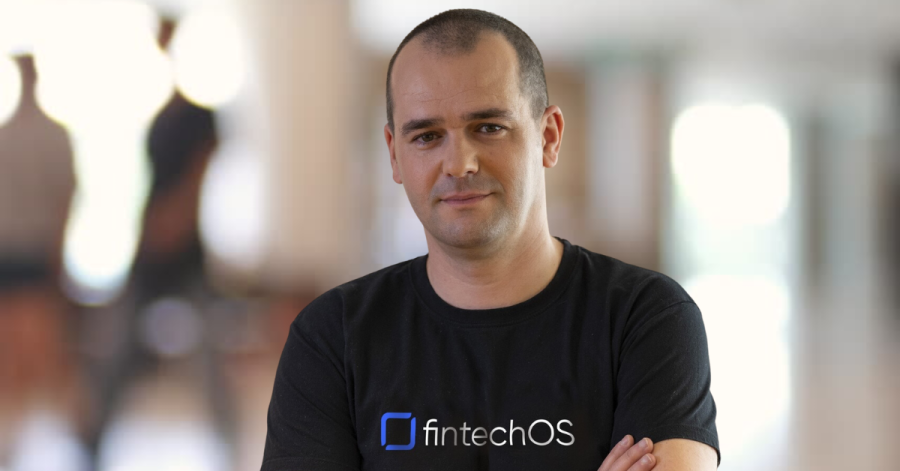Only have 1 minute? Here are the 3 key takeaways:
- FintechOS, the Romanian-founded platform that simplifies and accelerates the launching, servicing, and expansion of financial products and services, is changing its strategy and market approach.
- Founded in 2017 by Teodor Blidarus and Sergiu Negut, the fintech startup raised to date $100M from investors such as Draper Esprit, Earlybird, Gapminder Ventures, LAUNCHub Ventures, and OTB Ventures.
- In an interview for The Recursive, the FintechOS CEO Teodor Blidarus talks about closing some markets in the fast-evolving landscape of fintech, shifting their business focus, and the upcoming challenges of the business landscape in 2024.
Adapting Strategy Amid Market Shifts
Amid controversy sparked in Romanian media regarding layoffs at the company, Teodor Blidarus, CEO and co-founder, talked to The Recursive in an interview about strategy shift, lessons learned, and their views on the future.
“If I were to tell my younger self something with today’s learnings, I would say, focus on fewer markets, try to become an established player in those markets, and then scale. I think this is a lesson that we Europeans need to understand, and that’s why there are many more successful companies coming out of the US, because of the bigger total addressable market from day one”, thoughtfully remarked Teodor Blidarus.
The CEO of FintechOS characterized the changes at the company as a strategic adjustment targeting various aspects of the company’s operations. He noted: , “It’s a good practice to realign your operational strategy to your go-to-market strategies. I think there are elements of things that you cannot control. “
Blidarus mentioned that the company has a team of 200+ employees, spanning 4 main countries: Romania, Portugal, the UK, and the US. According to him, FintechOS is close to reaching $30M in revenue by the end of 2023, in anticipation of becoming profitable at the beginning of 2024, instead of the end of the next year, as planned initially.
In the future, FintechOS will concentrate its efforts only on CEE, France, the UK, and the US and stop activities in Germany, Singapore, Poland, and Spain – the markets they entered during the pandemic.
Regarding fundraising, the company is preparing to announce its new round in Q4 2024.
For more insights on the company’s strategy and how they respond to challenges, read further:
“Success is not linear and we need to accept it”
The Recursive: What have been your experiences and learnings at FintechOS since you started?
Teodor Blidarus: Success stories are rarely linear, right? There are many steps, some to the left, and some to the right. From this perspective, and given the fact that this is the third company that I’m building, I think a certain degree of flexibility in terms of your strategy is always needed. That has stayed with me through the years. But I should say that the most important lesson that I would share is that you need to be in control of your strategy. You need to assume that it’s your responsibility, even though there are going to be a lot of people around you – advising, board directors, investors. But at the end of the day, everybody looks at you from the co-founder and CEO position as making the decisions. I wouldn’t say that this is something I’ve learned from scratch, but something that has grown with me.
Fundamentally, you are the person accountable for the strategy and the results, and you have to have good people around you to advise, but the decision is yours. I think if I were to give advice to anybody, it is to assume responsibility for your strategies.
The second lesson is the importance of focus. I think, especially in the last 5-6 years, there have been a lot of opportunities in the market with venture capital investors penetrating Central and Southeast Europe. That created a lot of space for innovation. But at the end of the day, it also created space for people who were not necessarily experienced in expanding internationally, perhaps trying to do too much too soon. So, if I were to tell my younger self something about today’s learnings, I would say, focus on fewer markets, try to become an established player in those markets, and then scale. I think this is a lesson that we, Europeans, need to understand. That’s why there are many more successful companies coming out of the US because of the bigger total addressable market from day one.
You mentioned that IT companies, during the pandemic, had a boost in their activities and there were a number of opportunities hard to resist. There are more founders who scaled too fast during that period and now, as the market dynamics are changing, they need to look back and readjust. This is something that FintechOS has done as well, right?
Yes, it’s something that we’re looking to do. I think it’s a good practice to try to figure out and realign your operational strategy to your go-to-market strategies. I think there are elements that you cannot control. Looking back to the pandemic, nobody really knew how it would be.
If you would have to go through this again, would you restrain from growing the team?
Onboarding people in a company is easy but getting them to work together as a team and produce stuff, it’s fairly unknown how it would work out. For a startup that is easier, but once you surpass a certain threshold, perhaps 120-150 people, if you take 150 more people and you double the team to 300, the productivity is expected to drop. You just don’t understand how much. This is what I’ve seen over the years. Therefore, I think that being more focused and constantly realigning your operational strategy to reality and your ability to stay competitive is an important thing to do.
You’re saying that you can see that having a larger team doesn’t necessarily increase productivity. How do you analyze that?
I will say that typically having a larger team will decrease productivity. The big gamble or educated thing, depending on how you’re doing it, is by how much. So you are going to sacrifice that spirit of brotherhood and the ability to walk through the walls. You’re going to sacrifice that for the volume. There needs to be a threshold, so something is expected to be lost in terms of productivity. But the big thing is how are you going to control that loss?
I think we have to take into consideration that Europe is much more segregated in terms of cultural differences and the way we communicate and behave than the United States. That takes its toll every time you’re trying to scale because most likely, if you want to be a global player or global contender in the key markets, you cannot just source talent from just one country. And when that happens, it’s way easier to get distracted as you’re trying to assemble a team who haven’t worked together before but also marry people that are culturally different. Therefore, DNA that is fundamentally altered is going to take longer to be put together and reassembled into productivity.
That’s why just running faster is not enough. Because, at the end of the day, you might run faster, but if you haven’t necessarily reached the destination, then, what for?
What would you advise other founders who need to recalibrate their business right now, as FintechOS has done?
Success is not linear. It’s not dependent on vanity metrics, such as in how many people you employ. We’ve seen this through the years as the VC model grew bigger and bigger and people were reporting that the company had recruited 500 people. That is not an efficiency metric. So, I would say caring less about the vanity metrics, focus on the value and the volume.
Value is measured threefold: value for the customer, first and foremost, value for the employees, and value for the shareholders. As long as you keep growing in that direction, and you behave like a normal human being I think you move forward.
When you reorganized the team, you let go of some people. How did you communicate this to the people that will no longer be a part of the team, and how do you keep the motivation up for the people who are staying in the business, so you make sure their productivity doesn’t go down?
I think it’s fair to say that there is an element of stress whenever you are inducing change. Let’s say you hire a new head of sales, this is going to produce stress in the organization, right? Going through a crisis with a partner or a customer is going to induce stress, right? If the organization is anchored correctly in terms of values, I think it’s important to understand that you’re dealing with people and not machines. A lot of entrepreneurs tend to be more machine-like, I know I am. In this case, I rely a lot on the people around me to just say <dude, just calm down>.
I think the first advice would be to keep your ears open. People will tell you.
The second thing is to be as frank as it is, without kind of dancing around the table. Because it is likely that if people are working for you, then, it means that they are intelligent, right? Otherwise, you would not hire {them -ed. note.}. And with intelligent people, you can’t just go around the bush and kind of communicate unrealistic things. You have to tell it like it is. For some people, you have to expect that they will have the maturity to understand. Some people will not. And that’s fine, we all learn.
Thirdly, I think that it’s also important to understand and make others understand that there needs to be an element of self-motivation. I’ve never hired people that require motivation from my side. My job is to be a custodian of people’s commitment, dreams, and motivations. I feel responsible for that. But it’s not my job to instill motivation in people. So, if people are not increasingly motivated, as in people who want to be on the bus rather than push the bus, I would argue that they shouldn’t work for a startup.
I see a lot of animosities on both sides, founders or CEOs being frustrated by the lack of maturity or kind of business awareness of the people, and on the other side, some employees think that an organization is there to provide them with wealth. Neither of them is true. I think fundamentally, we are all responsible for the choices, and professional choices we make in life. And I’m happy to see, for example, that the younger generation, they have a far better understanding of how things go. Let me tell you one thing, everybody in the company can be successful elsewhere. They don’t need a certain company to be successful in their life. But equally so, nobody is irreplaceable in the company. I think it’s just like in a relationship. People could be successful and happy separately, but they choose to do it together. So, therefore, at that point, it becomes a choice.
The people want to stay in the company because they want to achieve something. I think this is one of the elements that you shouldn’t compromise when you’re recruiting people. A lot of us get distracted by how competent certain people are, either technical or in terms of expertise. And this is important. It’s very important to marry aptitude with attitude because just with attitude, you will not be able to make it fast. But fundamentally, people choosing to stay somewhere it’s not your merit. It’s their choice. So, if you look at things like this, then you understand that they will make their own choices, and your job is to provide clarity and useful information for them to make the choice.
As part of your new strategy, you stopped the business in certain markets like Germany, Singapore, Poland, and Spain. Based on what metrics did you decide these markets are not good for you?
Being a prevalent player in Poland, for example, requires, in the first two years, the same amount of money, energy, and focus as being a relevant player in the US. It’s probably a little bit of an exaggeration, but it is like this. Of course, in the later stages, it’s much more complicated to operate in a bigger market, you need more resources. But in the beginning, it’s not the size of the operation, it’s the trust of the market. So, for you to address that trust and to gain local competitive advantage, you have to spend a lot of focus. That led to our decision to just focus on Romania, Bulgaria, Greece, Southeast Europe, France, the UK, and the US.
I think it was unrealistic to think that we could play in new countries from day one. The product can be there, but localizing the sales intelligence and the brand takes time. We used to have people in Spain, for example. Spain is a big market, right? It has ties with Latin and South America, so you need to have real focus if you want to make it over there. Otherwise, you’re just the techie bunch of people who are in love with their product.
You said that a lot of changes happened to you during the pandemic, where there were more opportunities. There’s going to probably be another event, which will bring opportunities, hopefully not a pandemic. How would you handle this differently?
In my view, there needs to be a very, very compelling reason for us to, over the next, let’s say three years, focus on other markets. Because even if we are hugely successful in, let’s say, the UK, you can become a billion-dollar company just by being hugely successful in one market. There could be some compelling events, for example, the emergence of a highly specialized partner who just has a very strong plan that he commits to operate. I think that could happen, right? But in terms of us opening sales operations or customer operations over there, I don’t see it happening.
Also, you need to figure out when you need to expand. Because here’s the thing – you’re born in Romania, you dream about conquering the West, then you want to conquer the US, then you realize that it sounds a little bit irrational and naive. But I think a lot of us are effectively like that – we just want to prove that we can also do it. And yes, you can, but is there a point?
Looking at the future from the startup landscape perspective, how do you see the startup ecosystem evolving over the next two years?
I think there are a couple of mixed expectations. I think on one hand, you see a lot of transformative technology trends that are just becoming more mainstream. GenAI is an obvious one, but it’s not the only one. I think there will be a lot of opportunities for early-stage startups to raise capital and give it a shot. It was a little bit shaky in 2020 to the end, but I think 2023 has bounced back. And I think it’s going to continue moving forward.
But if you’re a startup past Series A, or Series B, I think the requirements are just going to be more stark. Because the reality is different. As I said, people are not measuring vanity metrics anymore. They measure real growth; they measure profitability; they measure a sustainable business model, and the quality of your customer portfolio. So I think from that example, from that perspective, it’s going to be way tougher for post-Series A companies who don’t have a mature business practice and haven’t established a layer of operational efficiency. They will, in my honest opinion, struggle to raise capital. Because I think 2024, in terms of risk management, you’re looking at the year with elections in the US, you’re looking at two large economic crises, one affecting mostly Europe, but the other is probably affecting everybody, including the US. So I would think the risk scrutiny around the operating model is just going to become way heavier in 2024 than in 2023. So, I think a lot of companies were expecting that 2023 was a bridge year. I don’t think 2023 is a bridge year. 2024 is going to be a more, not necessarily a difficult year, but certainly a year with way more challenges. I think the quicker you understand that the world has shifted, and we are in a cycle where some of the elements have become a little bit more old school rather than just vanity metrics, the better chance to connect to the new reality.








